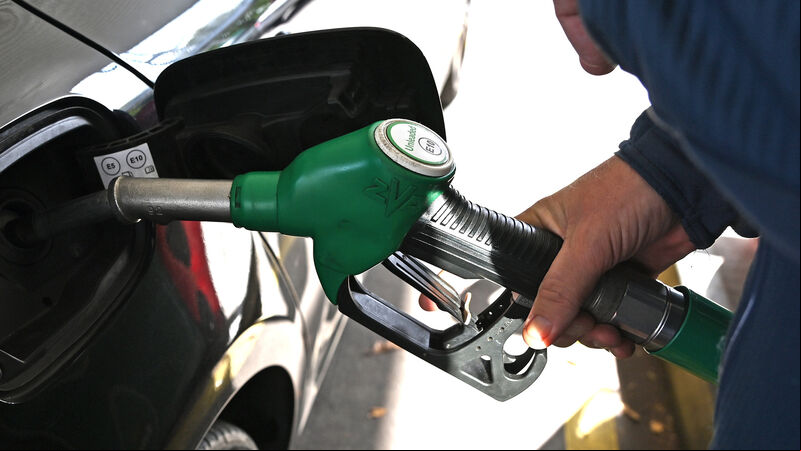Budget 2025: Motorists hit in the pocket as petrol and diesel prices to rise from next week

Petrol and diesel prices are set to rise across Cork from midnight on Tuesday, October 8. Picture: Eddie O'Hare

Petrol and diesel prices are set to rise across Cork from midnight on Tuesday, October 8. Picture: Eddie O'Hare
Petrol and diesel prices are set to rise across Cork from midnight on Tuesday, October 8.
Yesterday, Finance Minister Jack Chambers announced a €7.50 increase to the current rate of carbon tax, from €56 to €63.50.
The move means motorists will see a 60 litre fill of petrol and diesel rise by €1.28 and €1.48 respectively.
For other fuels, the rate increase will take place in May 2025, after the winter home-heating season.
Sinn Féin Cork South Central TD Donnchadh Ó Laoghaire said that the rise in fuel prices will “hit people in the pocket”.
“From next Wednesday, for those living in rural areas and for those who rely on their cars and don’t have the alternative of switching to public transport, that is a significant additional cost,” he said.
“The unfortunate reality is that the alternative that is public transport is not there for some people, it’s very hard to rely on it, and this is an additional cost on low- and middle-income workers.
“Fundamentally, the increase in petrol and diesel costs will hit people in the pocket.”
Independent Cork South Central councillor Paudie Dineen was also critical of the decision.
“They give it in one hand and take it in the other — the proposed increase in petrol and diesel will increase the cost of living even more,” he said.
CEO of Fuels for Ireland, Kevin Martlan said that while the budget claimed to focus on reducing the cost of living, the Government “is actually increasing costs on [the] consumer with its measures”.
He said the continuous rise in fuel prices is “not only hurting consumers but is counterproductive”, adding “it risks destabilising businesses and pushing more families into financial hardship”.
Head of marketing and PR at AA Ireland, Jennifer Kilduff, said the move will add roughly two cent per litre of petrol and diesel at the pump, adding:
“This measure will not only impact individual motorists, but also businesses relying on fuel-intensive transportation.”
While the increase in per tonnage costs ring negative for most motorists, there were some positive measures announced, including the end to the Motor Insurers Insolvency Compensation Fund levy, which will come into effect on January 1.
This will see the insolvency levy reduced from 1% to 0%, benefitting up to 2.2m policyholders.
Speaking on this introduction, Ms Kilduff said: “[It’s] a win, but a very small win for the motorist.
“They may see a small reduction in [their] , if the average is €500 to €700, customers will save [only] €5 to €7 annually.”
Amongst other changes introduced in Budget 2025, which will impact motorists, are amendments to the vehicle registration tax (VRT) regime for electric commercial vehicles which will see those that do not currently qualify for the lower rate of tax qualify for the €200 rate.
At present, due to the heavy battery weight, many electric vans exceed the 3.5 tonne limit for the lower rate, and by changing to an emissions-based approach, these vehicles will now come into line with their diesel alternatives.
In a bid to encourage the purchase of such vehicles, the new measures will provide for a lower 8% rate for category B vehicles with CO2 emissions of less than 120g per kilometre.
Benefit-in-Kind (BIK) tax will also see the €10,000 temporary reduction in the original market value of vehicles (including vans), with emissions below 180g/km, extended until December 31 of next year.
This meaning that, for an employee with an electric company vehicle, they will have an overall BIK relief of €45,000 in 2025, comprising the current €35,000 electric vehicle specific relief, plus the additional temporary universal relief of €10,000.
A BIK exemption for the provision of electric vehicle chargers at the home of company employees and directors was also announced alongside the extension.
The budget also included a reduction in the emissions level to qualify for vehicle capital allowances for company cars, where from January 2027, cars must emit less than 141g/km to qualify.
Mr Ó Laoghaire said: “There is a need for investment in electric vehicles, and while progress has been made in recent years, they’re very expensive, and it’s still very difficult for businesses to make the transition.
“We are way behind other countries in that regard, so measures to try and tackle that are welcome, as well as the changes to the BIK scheme.”
Keep up-to-date with the top stories in Cork with our daily newsletter straight to your inbox.
Please click here for our privacy statement.
Have you ed your FREE  App?
App?

It's all about Cork!
32 minutes ago
Over 12,000 children waiting for first from disability teams12 hours ago
Carer who died in house fire was a 'son, brother, partner, friend and rock'13 hours ago
Principal says sudden deportation of two pupils felt like a death in Dublin school13 hours ago
Man who attacked victim after being invited to house for food jailed for six yearsAdd Echolive.ie to your home screen - easy access to Cork news, views, sport and more